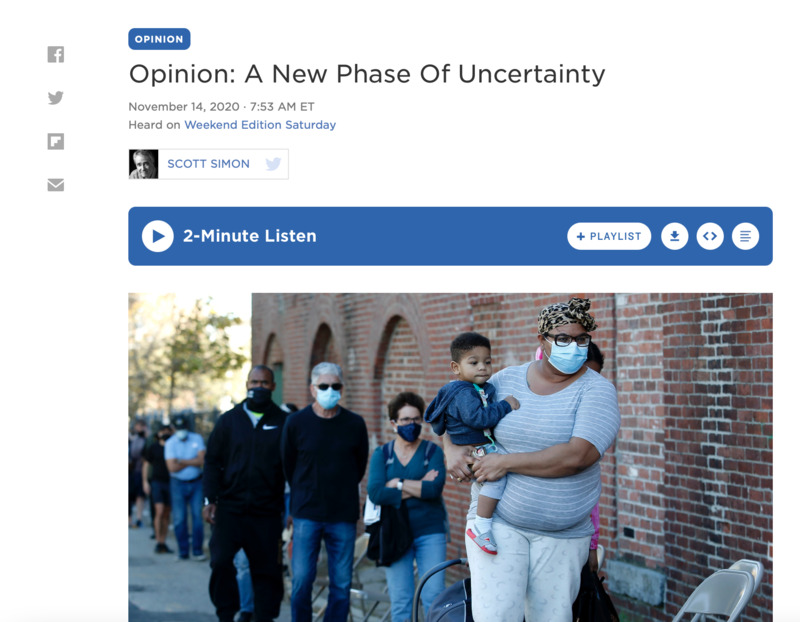Item
NPR short story November 14, 2020
Media
Title (Dublin Core)
NPR short story November 14, 2020
Description (Dublin Core)
I heard this short editorial of sorts during the 5pm hour today with my 4 good daughter on my lap at home. It helped me stop, reflect and take stock of everything.
We don't know when this will all be over. Those may be the hardest words to hear.
We spend most of our lives planning around calendars and clocks, schedules, seasons, schooldays, holidays, ETAs, projections and informed predictions.
I try not to compare any other tests in life to war. But because I've covered wars and conflicts, I think I recognize what many people in places like Sarajevo, Asmara, or Afghanistan always told me: it is not just the danger, but the uncertainty of not knowing when a crisis, the hardship, loss, and peril, will be over.
The coronavirus is now much more widespread than it was in March, when many of us began to count the weeks; which have become months; and now will clearly stretch into next year. Scientists have learned a lot about the virus, and refined treatments. But words we've sometimes used to try to get hold of what's happening may have put wrong metaphors into our minds. Wave is not quite right, because the coronavirus won't swell, then just fall, like an ocean wave. Surge is not quite right because at this point, more than eight months into the pandemic, the rise in cases is not sudden, but continuous. Many places, countries and states, that thought they had seen the worst, done the best, and moved on are again overwhelmed with new cases, and more losses. Each week, we learn more about people who no longer test positive for the virus but continue to struggle with prolonged symptoms of COVID-19, including shortness of breath, endless fatigue, and a kind of brain fog.
It is hard to have patience when we know, every day, of so many precious lives lost too soon. What may give glimpses of hope, though, is the work of people in so many places who mask up each day to keep life going: health care workers, bus and truck drivers, people who work in fields and stores, teachers and construction crews, and those who deep-clean the places where others work, including the very studio I'm in now.
We may not be able to defeat, overwhelm, or kick the coronavirus in the backside — more metaphors that now fall flat. But each day, we can help each other, and rise above fatigue and despair. We can wear masks, stay a social distance apart, avoid big gatherings, look for chances to make each other laugh, and help each other keep going, until that time when the masks we wear today can become souvenirs, instead of survival gear.
We spend most of our lives planning around calendars and clocks, schedules, seasons, schooldays, holidays, ETAs, projections and informed predictions.
I try not to compare any other tests in life to war. But because I've covered wars and conflicts, I think I recognize what many people in places like Sarajevo, Asmara, or Afghanistan always told me: it is not just the danger, but the uncertainty of not knowing when a crisis, the hardship, loss, and peril, will be over.
The coronavirus is now much more widespread than it was in March, when many of us began to count the weeks; which have become months; and now will clearly stretch into next year. Scientists have learned a lot about the virus, and refined treatments. But words we've sometimes used to try to get hold of what's happening may have put wrong metaphors into our minds. Wave is not quite right, because the coronavirus won't swell, then just fall, like an ocean wave. Surge is not quite right because at this point, more than eight months into the pandemic, the rise in cases is not sudden, but continuous. Many places, countries and states, that thought they had seen the worst, done the best, and moved on are again overwhelmed with new cases, and more losses. Each week, we learn more about people who no longer test positive for the virus but continue to struggle with prolonged symptoms of COVID-19, including shortness of breath, endless fatigue, and a kind of brain fog.
It is hard to have patience when we know, every day, of so many precious lives lost too soon. What may give glimpses of hope, though, is the work of people in so many places who mask up each day to keep life going: health care workers, bus and truck drivers, people who work in fields and stores, teachers and construction crews, and those who deep-clean the places where others work, including the very studio I'm in now.
We may not be able to defeat, overwhelm, or kick the coronavirus in the backside — more metaphors that now fall flat. But each day, we can help each other, and rise above fatigue and despair. We can wear masks, stay a social distance apart, avoid big gatherings, look for chances to make each other laugh, and help each other keep going, until that time when the masks we wear today can become souvenirs, instead of survival gear.
Date (Dublin Core)
Type (Dublin Core)
NPR Editorial, Audio
Link (Bibliographic Ontology)
Source (Dublin Core)
NPR
Controlled Vocabulary (Dublin Core)
Curator's Tags (Omeka Classic)
Collection (Dublin Core)
Date Submitted (Dublin Core)
11/15/2020
Date Modified (Dublin Core)
11/15/2020
09/05/2021
04/05/2022
09/25/2022
Date Created (Dublin Core)
11/14/2020
Item sets
This item was submitted on November 14, 2020 by [anonymous user] using the form “Share Your Story” on the site “A Journal of the Plague Year”: https://covid-19archive.org/s/archive
Click here to view the collected data.
